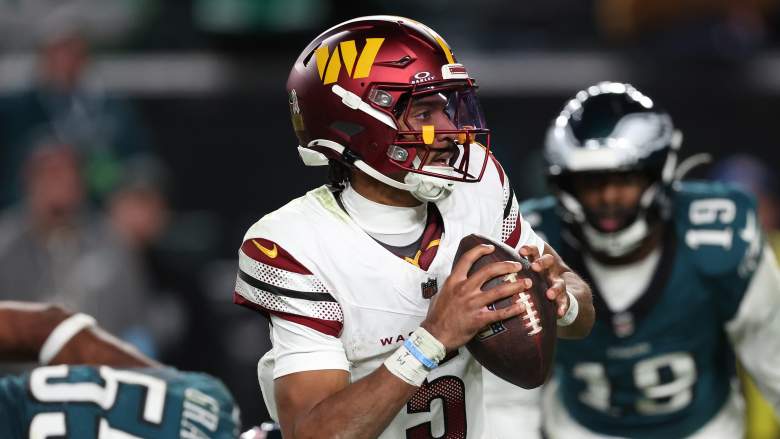
Getty Jayden Daniels and the Washington Commanders are facing a new challenge.
There’s a new problem brewing for the Washington Commanders and sensational rookie quarterback Jayden Daniels. It was brought to light by the Philadelphia Eagles in Week 11, and is something other NFL defenses will surely copy in an attempt to slow down Daniels and what was a high-powered offense.
Specifically, the problem concerns defenses altering their coverage schemes post-snap. The schematic riff was described in a report from ESPN: “the Eagles rotated coverages post snap frequently, which impacted the rhythm of the passing attack, one league source said. The Eagles sent an extra defender on only four plays, which allowed them to consistently play seven in coverage and take away deep shots. As a result, Daniels attempted one pass for more than 20 yards against Philadelphia.”
This strategy goes against the high-pressure plan the Pittsburgh Steelers used to stymie Daniels in Week 10. A more subtle use of disguised coverage could have greater, long-term impact on Daniels’ development.
Different Defensive Plan Should Worry Jayden Daniels
What the Eagles did was in sharp contrast to how the Steelers attacked the second-overall pick in the 2024 NFL draft. As ESPN detailed, “The Steelers’ blitzed Washington a season-high 19 times and were able to contain Daniels in the pocket with their five-man rushes and the game marked the first time Daniels recorded no scramble yards all season.”
Teams willing to blitz regularly seemed to have Daniels and the Commanders figured out. Yet, seeing increased pressure each week is a problem the Commanders could eventually solve for a variety of reasons.
Those reasons include Daniels’ elite mobility and natural escapability. Nothing develops a quarterback’s rushing skills as quickly as having to flee pass-rushers on almost every snap.
Offensive coordinator Kliff Kingsbury could also diffuse blitzing defenses by leaning more heavily into the play-action passing game. It’s an area where Daniels is already strong, having posted the “third-highest grade of all passers when using play action with a 92.1 mark,” according to Khaled Elsayed.
Countering a changing picture in coverage is a different challenge and arguably a tougher assignment.
A play broken down by Fran Duffy of PHLY Eagles showed the Eagles playing a man-coverage shell with some zone principles mixed in by middle linebacker Nakobe Dean and safety Reed Blankenship. The subterfuge forced a miscommunication between Daniels and his No. 1 wide receiver, Terry McLaurin.
There are multiple examples every week of the #Eagles back 7 handling pass-offs in zone coverage and working as a group to stifle passing game
Sometimes that execution can create some unforced errors for the offense. Here’s one that stood out to me against the #Commanders
Adapting to these in-play shifts will test Daniels’ ability to make the right reads and quick throws when defenses know he has to pass. That’s something dual-threat quarterbacks often struggle to master.
The comfortable confines of read-option plays that force defenses to load the box, guess and play a step slower, make things easier on the quarterback. Commanders fans only need to think back to Robert Griffin III’s electric rookie season in 2012 and subsequent downfall to recognize the short lifespan of this approach.
Daniels will need a more consistent answer to shape-shifting defenses.
Commanders Need to Stretch the Field
Getting Daniels back on track demands finding ways to stretch the field vertically. That’s something the Commanders couldn’t do in Philadelphia, a failing illustrated by ESPN’s Benjamin Solak.
Jayden Daniels throwing the ball tonight.
What a day for Vic Fangio and the Eagles’ defense. Quinyon Mitchell erased Terry McLaurin. Downfield windows were non-existent. Couple big catch-and-runs from the backs but otherwise a stifling performance. pic.twitter.com/fciubA7BNZ
— Benjamin Solak (@BenjaminSolak) November 15, 2024
https://platform.twitter.com/widgets.js
As Solak showed, Eagles’ defensive coordinator Vic Fangio forced Daniels to throw into underneath areas only. Fangio’s mix of coverages limited “Daniels to an average depth of target of 3.8 yards per attempt,” according to Thomas Valentine of Pro Football Focus.
It’s difficult for the Commanders to attack defenses deep when veteran McLaurin is the lone big-play threat among a suspect group of wide receivers. Kingsbury must design some more daring concepts and elaborate personnel groupings to manufacture the long gains Daniels and the Commanders need.
Gaining yardage in chunks will make defenses obvious, reducing them to parking two safeties deep and giving Daniels clearer reads pre- and post-snap.
James Dudko covers the New York Giants, Washington Commanders, New England Patriots and Baltimore Ravens for Heavy.com. He has covered the NFL and world soccer since 2011, with bylines at FanSided, Prime Time Sports Talk and Bleacher Report before joining Heavy in 2021. More about James Dudko



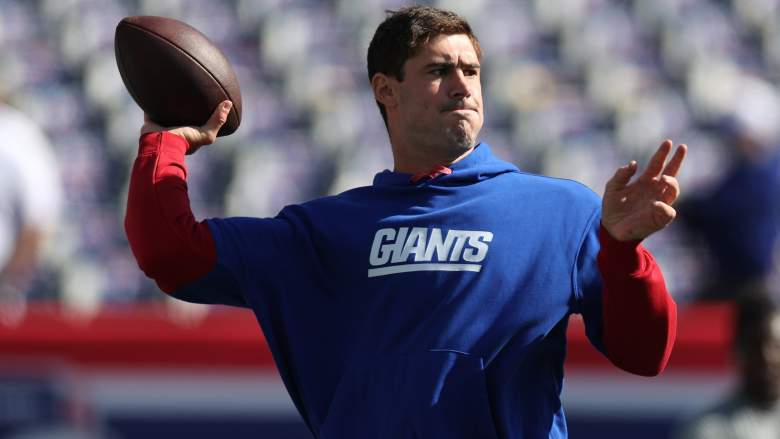

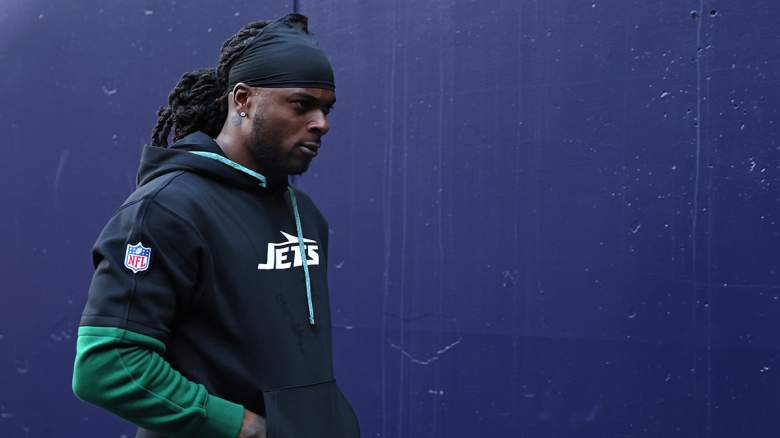
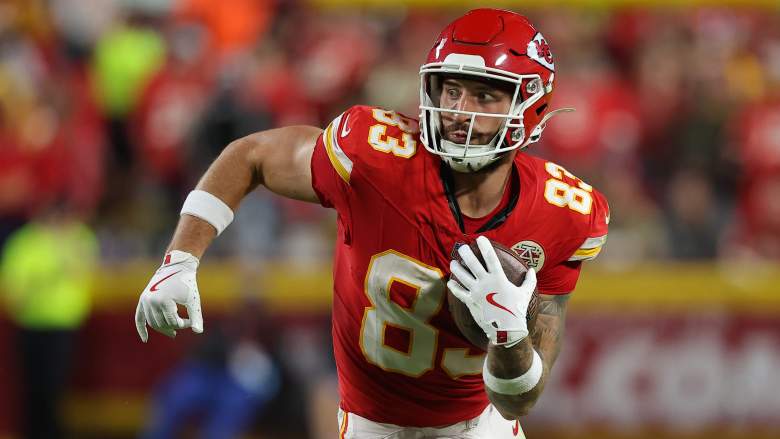
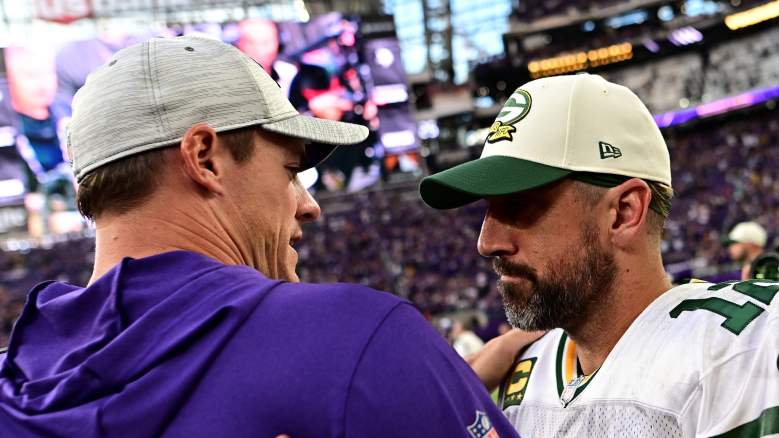
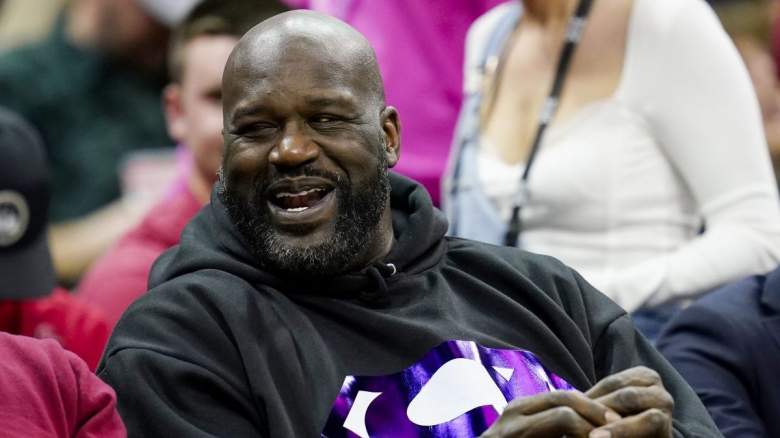





)





 English (US) ·
English (US) ·